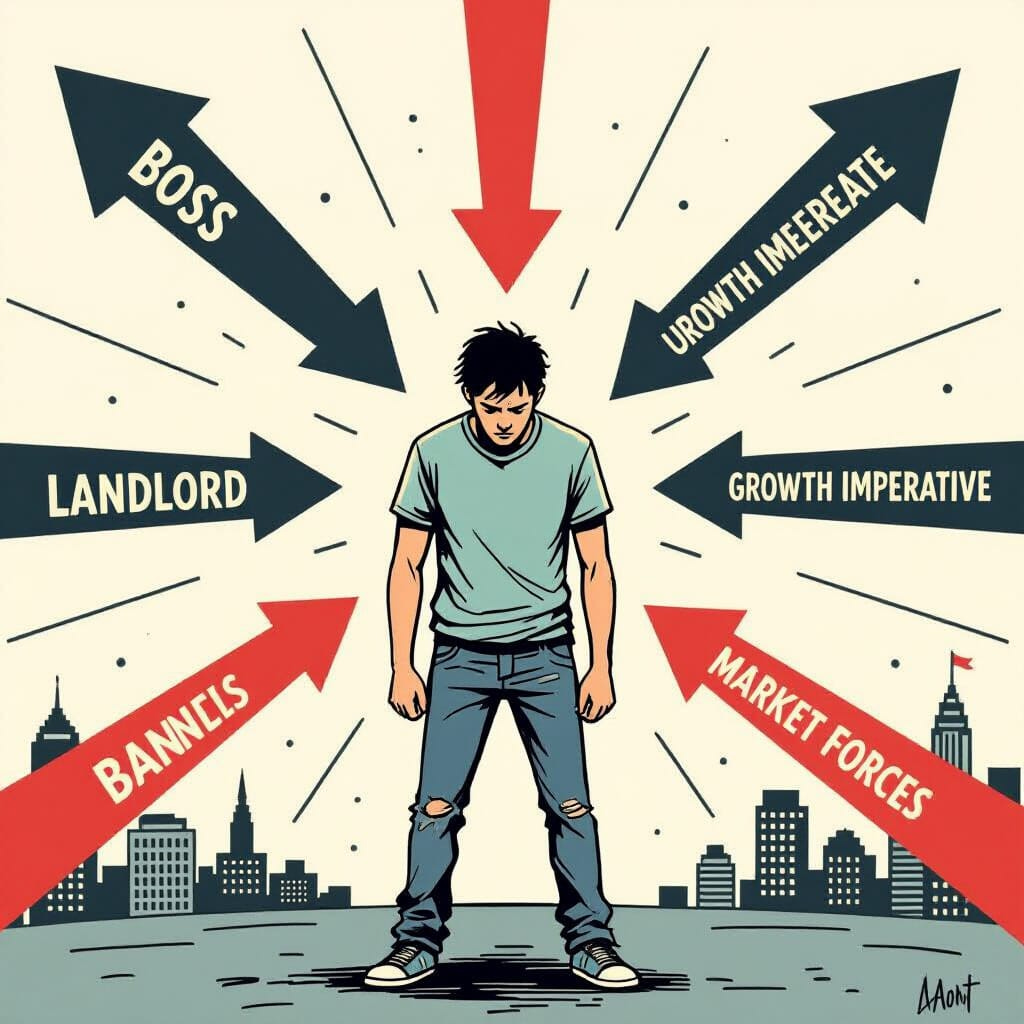Your Boss, Your Landlord, Your Bank: Are They Unwitting Agents of Usurpia (Or Worse)?
You Are The Subtitle!

Your boss, who demands longer hours for stagnant pay. Your landlord, who raises the rent yet again. Your bank, which hits you with unexpected fees or pushes a high-interest loan. In moments of frustration, it’s easy to see these individuals as the direct source of your financial uStrain. Are they greedy? Uncaring? Or perhaps something more complex is at play?
What if these people, the ones who often hold significant sway over your daily life and financial well-being, are themselves caught in the gears of a larger, often invisible system? A system we call Usurpia, which, through its inherent logic of debt, extraction, and manufactured scarcity, subtly compels or heavily incentivizes them to act in ways that perpetuate its cycle, even if they are not consciously "evil"?
This isn't about excusing genuinely harmful individual behavior. But it is about understanding that within Usurpia, many individuals in positions of everyday power become, willingly or unwillingly, agents of its systemic pressures.
A Note from Atotsm: "Usurpia" is the term we use for the overarching socio-economic system built on debt-money and other often-hidden rules. The 'u' terms (like uNormalizationEnforcement) are from our developing uGlossary designed to bring these dynamics to light. Find more at Zipcadia (zipcadia.gumroad.com).
Let's explore how seemingly ordinary roles can become transmission belts for Usurpian mechanics:
1. The Boss: Enforcing the uRatRace & uExtraction
The Pressure They Face: Your boss is likely under pressure from their superiors or the market (which is itself shaped by Usurpian uGrowthFetishism) to maximize profits, cut costs, and increase productivity. Their own job security and advancement often depend on meeting these metrics.
How They Become an Agent: This pressure can translate into:
Suppressing wages to improve the bottom line.
Demanding unpaid overtime or an unsustainable pace of work.
Implementing performance metrics that prioritize system-defined "value" over human well-being or genuine contribution (uBullshitJobs can result).
Resisting calls for better working conditions or unionization, as these might impact short-term profitability.
Unwitting or Worse? Many bosses are simply trying to survive and succeed within the rules of the game they've been given. They might genuinely believe they're doing what's "necessary for the business." However, if they consciously exploit or dehumanize employees for personal gain beyond systemic pressures, their role shifts from "unwitting" to something more culpable within the Usurpian framework. The uSociopathFilter can sometimes elevate those most willing to enact uEthicalInversion.
2. The Landlord: Riding the Wave of uFinancialization & uImposedDebt
The Pressure They Face: If your landlord has a mortgage on the property, they are subject to the bank's interest demands (uMoney as debt). Property taxes and maintenance costs rise. In areas with high demand (often fueled by speculative investment – uFinancialization), there's market pressure to maximize rental income.
How They Become an Agent: This can lead to:
Regularly increasing rent to match or exceed "market rates" (which are themselves inflated by Usurpian dynamics).
Minimizing spending on maintenance to protect profit margins.
Strict enforcement of lease terms that can feel punitive.
In some cases, participating in uGentrification that displaces long-term residents.
Unwitting or Worse?: Many small landlords are just trying to cover their own costs and make a modest return. They're playing the property game by Usurpia's rules. However, large corporate landlords or those who engage in predatory practices, seeing housing purely as an extractive asset rather than a human need, lean towards the "worse" end, fully embodying the system's exploitative potential.
3. The Bank(er): The Gatekeepers of uDebt & Enforcers of uInterest
The Pressure They Face: Banks are designed, within Usurpia, as for-profit institutions whose primary mechanism for profit is the creation of uMoney as interest-bearing debt. Individual bankers have sales targets, performance goals, and operate within a regulatory framework that supports this model.
How They Become an Agent: This manifests as:
Actively marketing loans and credit cards, encouraging uDebtNormalization.
Charging fees for services that were once free or low-cost.
Prioritizing lending to those who can generate the most interest, often regardless of the social utility of the loan.
Enforcing the collection of uInterest, which, as we know, is the component of debt never initially created, thus ensuring systemic uScarcity.
Unwitting or Worse?: Your local bank teller might be a friendly face just doing their job. However, the institution itself is a core pillar of Usurpia. Those at the higher echelons who design and profit massively from these systemic mechanisms of uSeigniorage and uExtraction are far from "unwitting." They are the architects and primary beneficiaries.

Navigating This Awareness: Beyond Blame to Systemic Understanding
Recognizing these dynamics isn't about starting witch hunts against every boss or landlord. It's about:
Reducing uVictimBlaming (of yourself AND them, to a degree): Understanding that the person across the desk from you is often also caught in Usurpia's web can shift anger to a more nuanced understanding, without necessarily excusing harmful behavior.
Identifying Systemic Leverage Points: If your boss is under pressure from "above," who is pressuring them? Tracing the lines of force can reveal deeper systemic issues.
Fostering uEmpathyAwakened (Carefully): We can have empathy for someone's difficult position within the system while still holding them accountable for their choices and resisting their harmful actions.
Focusing on System Change, Not Just Individual "Villains": While egregious individual actors exist, lasting change comes from altering the rules of the game that incentivize or compel these behaviors. This is where understanding Usurpia's uFirstPrinciples becomes paramount.
Recognizing Your Own Potential Complicity (uDegreesOfComplicity): In what ways do we unwittingly uphold the system through our own consumption, compliance, or silence (uComfortIgnorance)?
The truth is, Usurpia operates through people. Some are conscious architects, some are willing profiteers, and many are simply "following orders" or doing what seems necessary to survive and thrive within the given parameters (uNormalizationEnforcement).
By seeing the systemic pressures, we can better strategize how to engage, how to resist (uMicroResistance), and how to build uAlternativesTrue that don't rely on these exploitative dynamics. The goal isn't just to identify the agents, but to transform the agency-warping system of Usurpia itself.
Have you felt pressured by a boss, landlord, or bank in a way that now seems connected to these deeper Usurpian dynamics? How does understanding the systemic pressures change your perspective on these interactions? Share your experiences and thoughts below.
To truly understand the forces that shape these everyday power dynamics and to learn how Usurpia's uFirstPrinciples create these pressures, explore Atotsm's work and the full uGlossary at Zipcadia (zipcadia.gumroad.com). Subscribe to 'The Usurpia Chronicles' for more insights into navigating and changing our systemic reality.



